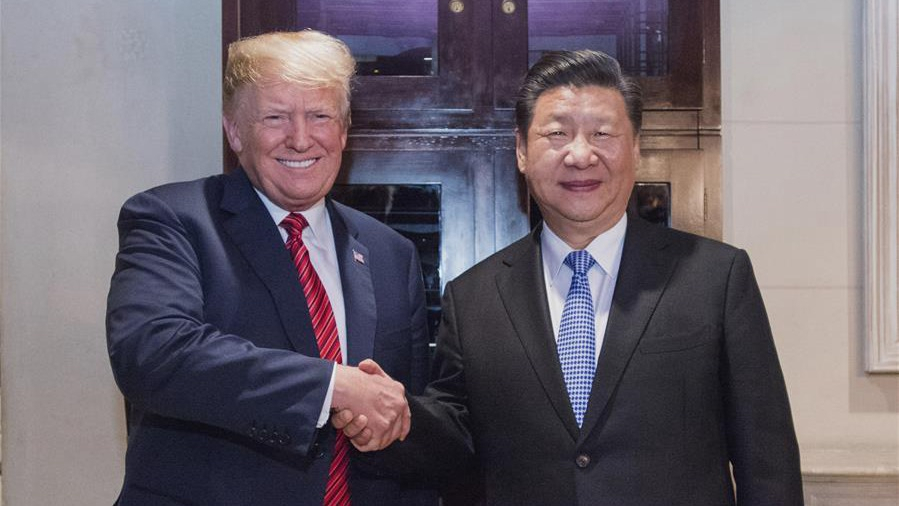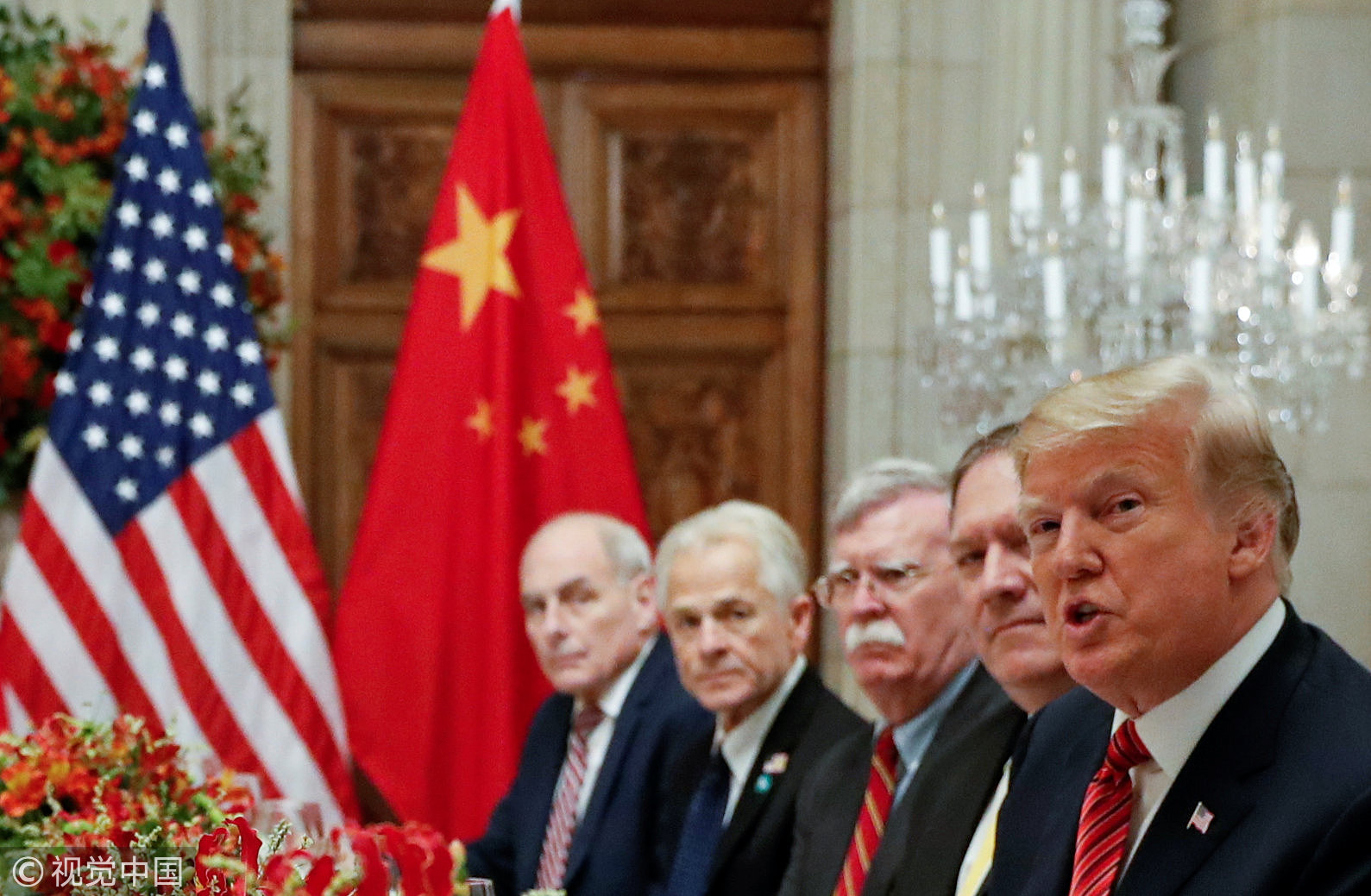
Opinions
12:19, 03-Dec-2018
Opinion: Xi-Trump meeting: A possible breakthrough in China-U.S. trade war
Updated
11:39, 06-Dec-2018
Ken Moak

Editor's Note: Ken Moak, the co-author of the 2015 book "China's Economic Rise and Its Global Impact," taught economic theory, public policy and globalization at the university level for 33 years. This article reflects his opinion, and not necessarily the views of CGTN.
On December 1, U.S. President Donald Trump agreed that tariffs on 200 billion U.S. dollars' worth of Chinese goods will remain at 10 percent instead of rising to 25 percent on January 1, during a post-G20 summit meeting in Buenos Aires. Trump and President Xi Jinping reached a 90-day trade truce, keeping the impending tariff hike at bay. Both leaders managed to hold off on adding new tariffs, and immediately start negotiations on a host of issues such as forced technology transfer, intellectual theft, trade in services and agriculture, and other outstanding items.
China emerged from the meeting willing to buy a substantial amount of U.S. products to reduce the alleged 375-billion-U.S.-dollar deficit. Purchases would include agricultural products and energy products. China also promised to penalize people for sending the addictive drug Fentanyl to the U.S.
The “U-turn” on settling issues that emerged from the Trump-Xi meeting on December 1 might be inspired by economic and geopolitical reality, but it could be the start of a more pragmatic and healthy China-U.S. relationship. Chinese President Xi Jinping is right, negotiations on the basis of equality and fairness are the only way going forward. In this case, it could yield significant benefits for the two economic giants and the rest of the world.
Potential benefits of truce on the global economy and polity
Considerable economic and geopolitical dividends could emerge in light of the truce, in that de-escalating the trade war might lead to less geopolitical and military tensions between the two countries.

U.S. President Donald Trump (R), his National Security Adviser John Bolton (3rd R) and U.S. Secretary of State Mike Pompeo (2nd R) attend a working dinner with Chinese President Xi Jinping (not pictured) after the G20 leaders' summit in Buenos Aires, Argentina, December 1, 2018. /VCG Photo
U.S. President Donald Trump (R), his National Security Adviser John Bolton (3rd R) and U.S. Secretary of State Mike Pompeo (2nd R) attend a working dinner with Chinese President Xi Jinping (not pictured) after the G20 leaders' summit in Buenos Aires, Argentina, December 1, 2018. /VCG Photo
Without the threat of additional tariffs hanging over their heads, enterprises in both countries and those of nations involved in the global supply chain could resume normalcy in their businesses. Trade is 30 percent of the world economy, this could enhance sustainable global economic development. For example, the Republic of Korea (ROK), Japan, and other countries integrated into the supply chain could breathe a sigh of relieve.
Perhaps more important is the trade truce established by the Xi-Trump meeting could be the answer to U.S. farmers' prayers. Re-entering the huge Chinese market could renew the hope of a better future. The trade war has reduced prices substantially and created an undesirable level of inventory.
Differences remain deep and wide
Though there are reasons for joy, the differences between the world's two largest economies remain deep and wide, and cannot be easily resolved because they are motivated largely by geopolitics and perceptions.
For example, the accusation of China forcing technology transfer might be more perception rather than real. Technology transfer is a condition of doing business in China. Besides, one would think the U.S. or any foreign partner would want to apply its technology into the partnership because that would increase productivity and profitability. It should also be pointed out that the U.S. partner sold the technology to its Chinese partner at a high price.
Compounding the problem is U.S. domestic politics, in that Congress harbors deep anti-China sentiments as evidenced by its passing of the Taiwan Travel Act and other acts. They were meant to “contain” or “destabilize” the Asian giant. For example, allowing senior U.S. government and military officials to travel to the island is a violation of the “one-China” policy. On trade, the U.S. Congress might be more “hawkish” than Trump, introducing legislation to block the president's ZTE deal.
However, the willingness to address the issues through dialogue is a bold step and the right thing to do, paving the way to a healthier China-U.S. relationship. Talking allows a better understanding between the two sides as well as forming personal relationships. For example, it was through their continual dialogue that Mr. Trump and Mr. Xi have become “friends,” without that personal “chemistry,” the trade truce might not be possible.
What will the U.S.-China relationship look like?
Future Sino-U.S. relations will likely be “rocky,” but could be more cooperative than competitive, in light of developments from the recent Xi-Trump meeting in Argentina. Both sides appear to realize that they need each other to address global issues such as the Korean Peninsula's denuclearization, climate change, trade conflicts, and others.

An American farmer walks through his soy fields in Harvard, Illinois, July 6, 2018. /VCG Photo
An American farmer walks through his soy fields in Harvard, Illinois, July 6, 2018. /VCG Photo
What's more, the Chinese and American economies are increasingly intertwined, suggesting escalating the trade war would incur irreparable damages to the U.S, China and the world.
A comment
The trade truce is the right thing to do and could be the first step toward better Sino-U.S. relations. No doubt the stock markets, business, U.S. farmers and world leaders will welcome it. How much it can influence policy, however, depends largely on the U.S. because China has always believed trade or military wars benefit no one. It was mostly paranoia, fearing China might supplant American supremacy, on the part of the U.S. Congress and neoconservatives, which led to the deterioration of the China-U.S. relationship.
(If you want to contribute and have specific expertise, please contact us at opinions@cgtn.com.)

SITEMAP
Copyright © 2018 CGTN. Beijing ICP prepared NO.16065310-3
Copyright © 2018 CGTN. Beijing ICP prepared NO.16065310-3